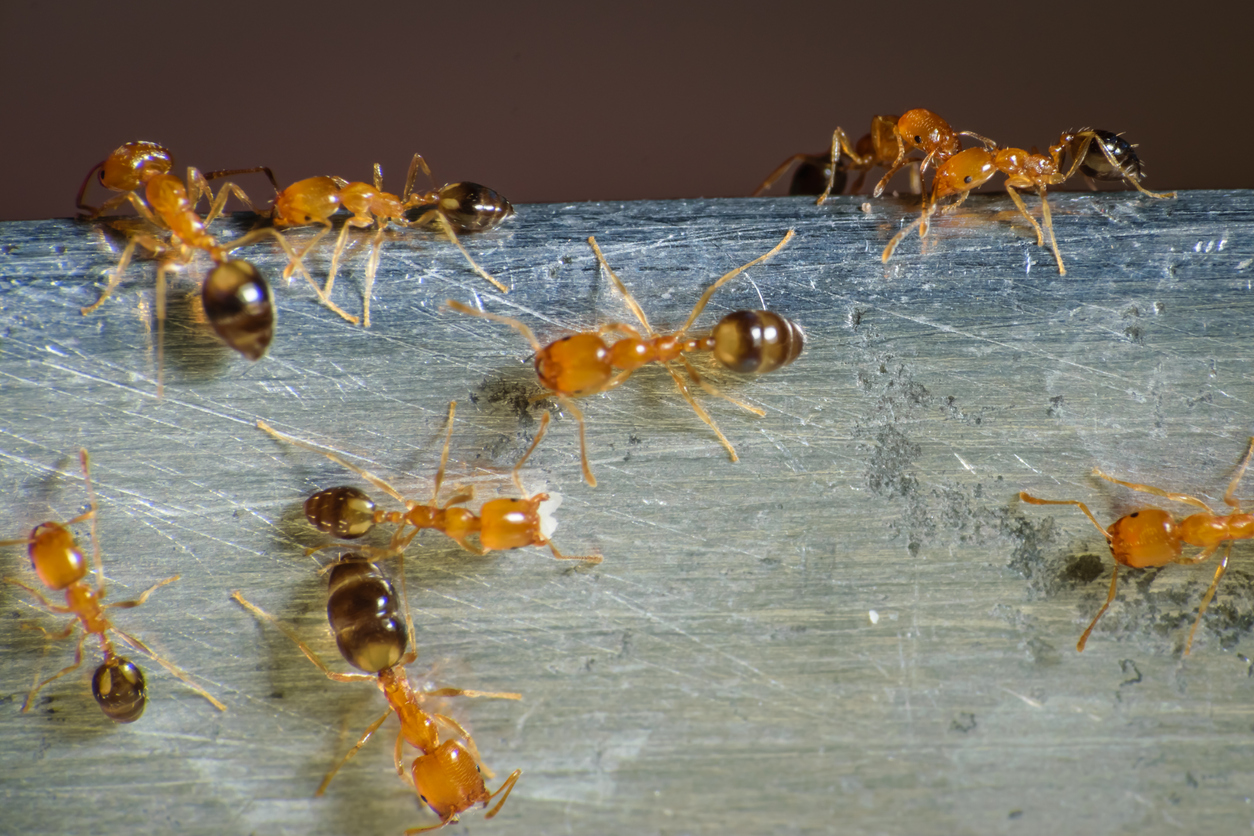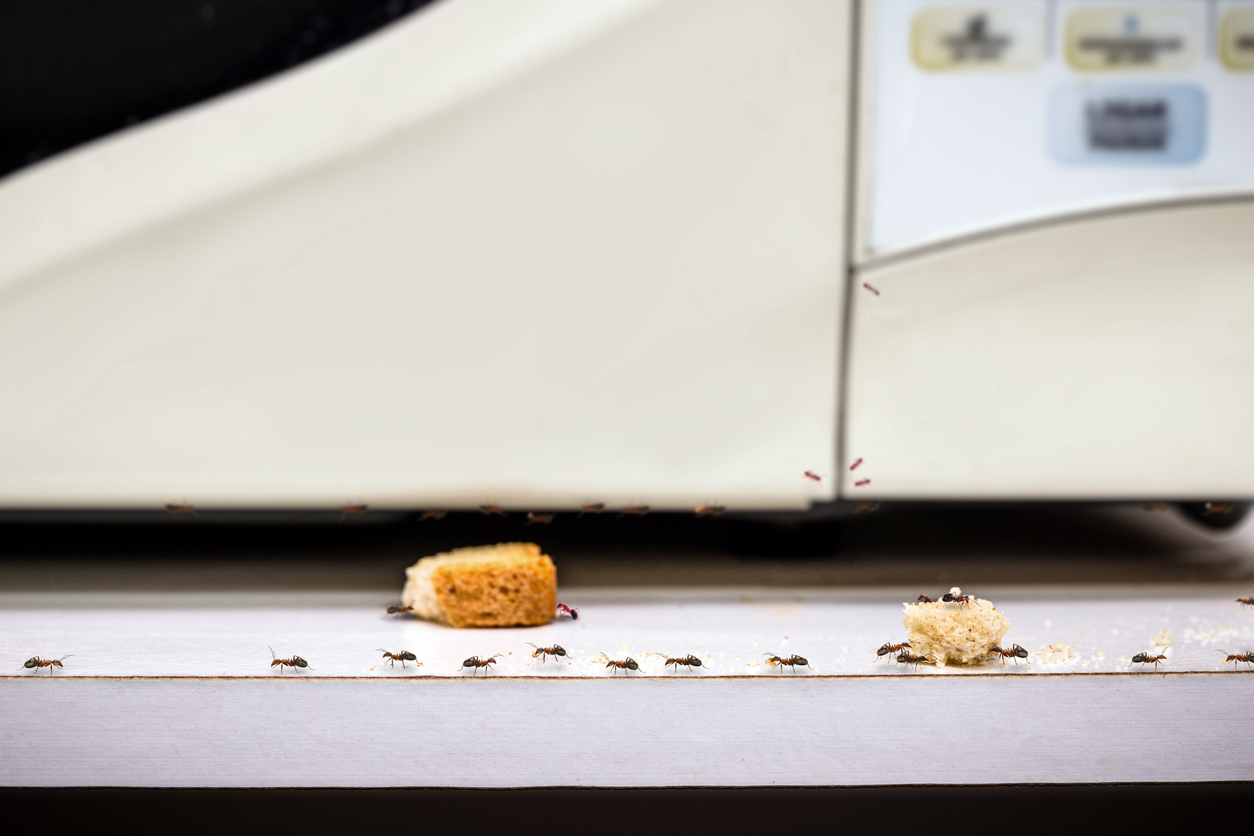Pharaoh Ants
What are Pharaoh Ants?
Pharaoh ants most likely got their name because they were thought to be one of the seven plagues of Egypt mentioned in the Bible. Whether they troubled the ancient Egyptians are not, they are certainly a nuisance to Florida and for much of the warmer areas of the United States!
Know Your Enemy
Like most ants, pharaoh ants, also known as Monomorium pharaonis, live in colonies of 1,000 to 2,500 ants, including up to 200 queens. But problems arise because these ants love to make their colonies inside human habitations.
With Pharaoh Ants, Size Doesn’t Matter
Pharaoh ants are one of the smaller ants, and they are usually only 1/16 to 1/12 of an inch long. They are reddish brown, though the abdomen may be a darker brown. They have two compound eyes that have 20 facets. Like nearly all insects, their bodies are made up of the head, the thorax, and the abdomen, and they have six jointed legs. They use their antennae to pick up vibrations, and their skeleton is on the outside of their bodies. This exoskeleton is made of chitin, which is much like the keratin that makes up the hooves and fingernails of other animals.
The pharaoh ant queen’s job is to lay eggs
The Queen keeps the colony going. After she mates with one or more males, she stores the sperm in her body and uses it to fertilize her eggs. She only has to mate once in her life. About five days after they are laid, her eggs hatch. They are cared for by the worker ants until they go into a pupal stage, where they don’t eat. After this, they hatch into adults. It takes about a month and a half for a pharaoh ant to develop from an egg to a mature adult.
Like other arthropods, pharaoh ants need to molt their exoskeletons to grow, and the larva molts several times before it pupates.
The pharaoh ant queen’s job is to lay eggs
The Queen keeps the colony going. After she mates with one or more males, she stores the sperm in her body and uses it to fertilize her eggs. She only has to mate once in her life. About five days after they are laid, her eggs hatch. They are cared for by the worker ants until they go into a pupal stage, where they don’t eat. After this, they hatch into adults. It takes about a month and a half for a pharaoh ant to develop from an egg to a mature adult.
Like other arthropods, pharaoh ants need to molt their exoskeletons to grow, and the larva molts several times before it pupates.
Sexually mature pharaoh ants have wings and take to the air for nuptial flights.
The males and females both do this. The male pharaoh ants die soon after mating, but the queens chew their wings off and begin their colonies. At first, the new queen will have to take care of her offspring herself. After they mature, they take care of her and all of the other brood. Another habit that makes the pharaoh ant such a pest is that sometimes ants will carry a new queen and some of the brood to another nest site, often in the walls or beneath the floors of the house, and a satellite colony develops.
Pharaoh Ant Hierarchy
Besides the queen or queens, pharaoh ant colonies have workers and winged ants, or alates. The female pharaoh ant workers are sterile and the males are there to mate, though they also help protect the colony. Workers tend the eggs and larvae, collect food and guard the nest. Interestingly, fertilized eggs result in sometimes sterile females, while unfertilized eggs result in fertile males. Pharaoh ants communicate through pheromones, but unlike other ants, pharaoh ants are not blind and actually have good vision.
What Pharaoh Ants Eat
Pharaoh ants eat just about anything. All ants eat two food groups: sugar and protein. They can eat starch products, but that’s typically only if the other the other two food sources are not readily available. Sugar is produced naturally by plants, usually in the form of honeydew, in the spring. Pharaoh ants turn to protein in late summer, fall, and into the winter to ensure their survival through the cold month. The pharaoh ants like sweet things, greasy foods, fried foods, and are even drawn to the scent and taste of bandages. Blood stains may be attractive to an ant because blood or plasma is actually protein. This is why pharaoh ants are notorious pests in hospitals and doctors’ offices. Their taste for bandages causes them to enter wounds and spread pathogens and disease. Ants tend to become a nuisance to medical facilities from about July through late March in Florida (unless there is an abundance of cakes, cookies and other sweets in the break rooms!). They have even been known to eat shoe polish. Bedbugs stay away from places inhabited by pharaoh ants, and they will also dispose of the carcasses of dead insects, but of course this is still not enough to want them in the house.
What Pharaoh Ants Eat
Pharaoh ants eat just about anything. All ants eat two food groups: sugar and protein. They can eat starch products, but that’s typically only if the other the other two food sources are not readily available. Sugar is produced naturally by plants, usually in the form of honeydew, in the spring. Pharaoh ants turn to protein in late summer, fall, and into the winter to ensure their survival through the cold month. The pharaoh ants like sweet things, greasy foods, fried foods, and are even drawn to the scent and taste of bandages. Blood stains may be attractive to an ant because blood or plasma is actually protein. This is why pharaoh ants are notorious pests in hospitals and doctors’ offices. Their taste for bandages causes them to enter wounds and spread pathogens and disease. Ants tend to become a nuisance to medical facilities from about July through late March in Florida (unless there is an abundance of cakes, cookies and other sweets in the break rooms!). They have even been known to eat shoe polish. Bedbugs stay away from places inhabited by pharaoh ants, and they will also dispose of the carcasses of dead insects, but of course this is still not enough to want them in the house.
Fortunately, pharaoh ants don’t swarm
If alerted by chemical signals and led by chemical trails, a group will gather on any food that has been left out. Interestingly, if food is scarce, a worker returning to the nest with a morsel may refuse to give any to the queen.
Predators of Pharaoh Ants
There are currently no known natural predators of pharaoh ants. Biologists believe that because these ants are so tiny, nothing bothers to eat them.
Signs of a Pharaoh Ant Infestation
Pharaoh ants are small ants that build correspondingly small nests, and they are hard to detect. Finding a group of them around a bit of spilled sugar or other food is one way to know that there’s an infestation. They also chew holes in clothing. Exterminating them is tricky, for sprays only cause them to scatter and build somewhere else in the residence. It might be time to call in a professional!
Looking to Get Rid of a Pharaoh Ant Problem Today?
Bugs by Brian has years of experience managing Pharaoh Ant problems and we offer service options that can assist you today!
St. Louis, Missouri
Email: scheduling@bugsbybrian.com
Call: (636) 394-0101
Location: 1401 Marsh Ave., Ellisville MO 63011
Melbourne, Florida
Email: scheduling@bugsbybrian.com
Call: (321) 674-1665
Location: 3830 S. Highway A1A Suite, 4135 Melbourne Beach, FL 32951
Ready to get started?
We offer free, no obligation estimates for all our pest control services.
Follow us on our social media plateforms


